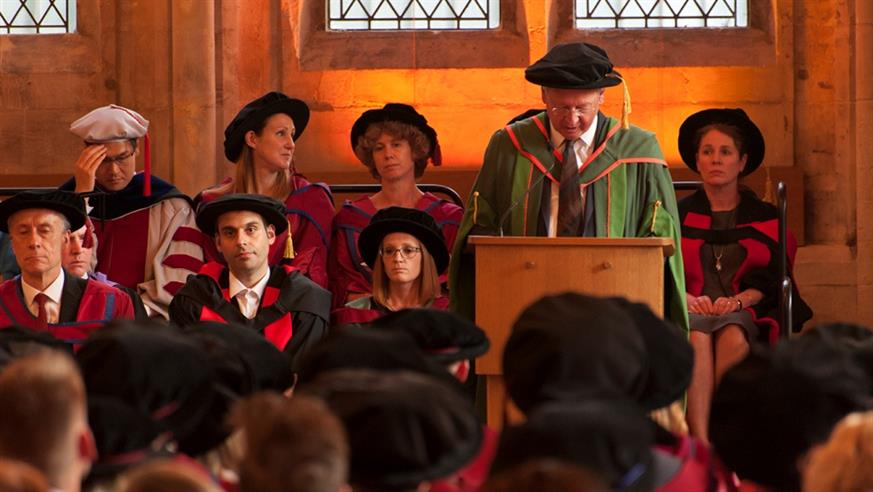
Image: Paul Workman speaking at graduation (Credit: Jan Chlebik for the ICR 2019).
A new generation of cancer researchers took to the stage at London’s Guildhall this week as The Institute of Cancer Research, London, held its annual awards ceremony.
The ceremony celebrated the hard work and achievements of our 2019 student graduates – and set them off on their path as independent researchers.
The award ceremony is a highlight of the ICR’s calendar each year, marking one of our core strategic goals to invest in the future of cancer research by educating and training the next generation of cancer scientists and clinicians.
Christopher's Smile founders, Kevin and Karen Capel, were also awarded honorary degrees at the 2019 Annual Awards Ceremony.
Some 37 PhD graduates and seven MD(Res) graduates were commended for their hard work to contribute new knowledge to their chosen field of research.
We also congratulated two students who graduated with an MSc in Oncology and 43 students who achieved other postgraduate awards in Oncology.
The University of London's Vice Chancellor Professor Wendy Thomson CBE handed out the awards to our graduating students.
Recognising outstanding achievements and service
ICR Chairman Luke Johnson presented three prizes for outstanding achievement to graduating PhD students Ben O’Leary and Anna Wilkins, and MD(Res) student Dr Charlotte Fribbens.
Ben transferred from aeronautical engineering to medicine, and in his PhD he developed novel techniques to assess circulating tumour DNA. He showed that detecting early changes in circulating tumour DNA provides a robust biomarker to predict how breast cancer responds to new drugs such as palbociclib that inhibit CDK4/6.
Anna's work has helped improve predictions for individual patients of how effective new radiotherapy regimens will be that give radiation in fewer, larger doses. Her work analyses biomarkers of prostate cancer cell biology to judge the likely treatment outcome.
Charlotte developed a liquid biopsy blood test for oestrogen receptor mutations in breast cancer – as a means of assessing the likelihood of resistance to anti-oestrogen therapy. Her definitive publication on the clinical significance and benefit of testing for oestrogen receptor mutations has changed clinical practice.
Honouring valuable contributions
In addition to awarding degrees, the ceremony also provides an opportunity to thank and mark the achievements of people who have made crucial contributions to the ICR.
Former staff members Dr Lawrence Davies, Mr Chris Chandler and Mrs Sue Braddish were appointed Associates of the ICR for their long-standing service and commitment to our institution.
They served for 117 years between them at the ICR in the Division of Cancer Therapeutics, and across our stores and procurement services.
Professor Paul Workman, Chief Executive of the ICR, themed his closing remarks around breaking down barriers in science, between disciplines, organisations, sectors and nationalities, and urged graduating students to seize the opportunities available.
He said: “The future of cancer research is bright and lies in our ability to bridge, and ultimately dissolve, the boundaries between research disciplines, together with free and unrestricted collaboration and partnerships between scientists and organisations around the world, in order to drive new breakthroughs in our understanding of cancer and faster translation to benefit cancer patients.”